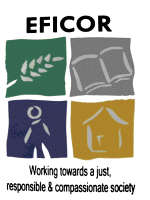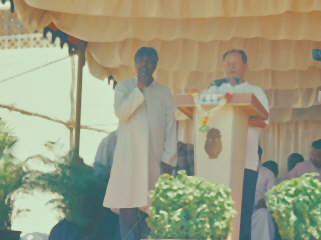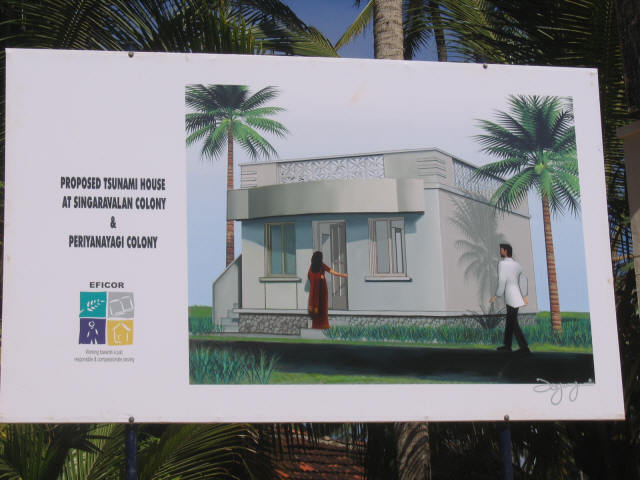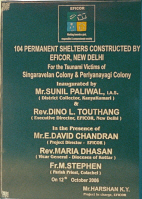An Advent sermon for St Peter’s Bramley, Sunday 27 November 2022
I was given the title for this sermon by our new Rector. For more details of the Tearfund project referred to here, see https://www.tearfund.org/stories/2022/06/turning-guns-into-garden-tools-in-the-drc or the video at https://www.youtube.com/watch?v=4xCD6z3bAas
Advent is often presented as a time of waiting. But over the next four Sundays leading up to Christmas we’re looking at four of the great themes of Christianity as found in the book of Isaiah: Hope, Peace, Joy and Love – and why actually they cannot wait. We start today with the idea of ‘Hope’.
Hope can mean different things to different people. Some of you will know Sue Davey, a member of our congregation who can’t get to church these days. She recently put it like this:
“Without hope life really is hopeLESS. We need to have hope that things will work out in the end, that things will get better. That will be different for every one of us. Hope makes life worth living.”
The prophet Isaiah lived in troubled times like ours. Fewer people were worshiping God and doing what God wanted them to do. There was an increase in crime, leaders had become corrupt, the rich were getting richer and no-one was looking after the poor. In countries all around there was war, and sooner or later war would come even to his city of Jerusalem. The situation may well have seemed hopeless.
But through this book of Isaiah with all these troubles, there runs a thread of hope like a rainbow appearing out of a dark cloud. Isaiah had a vision from God. A vision of what God would do to bring hope out of despair. A vision, as we see in today’s reading, of God breaking into human life to end war and bring peace. This striking image of swords being beaten into ploughshares, that is, weapons becoming farming tools, is a picture of what can happen when we let God make that vision a reality. But what if someone decided to take it literally?
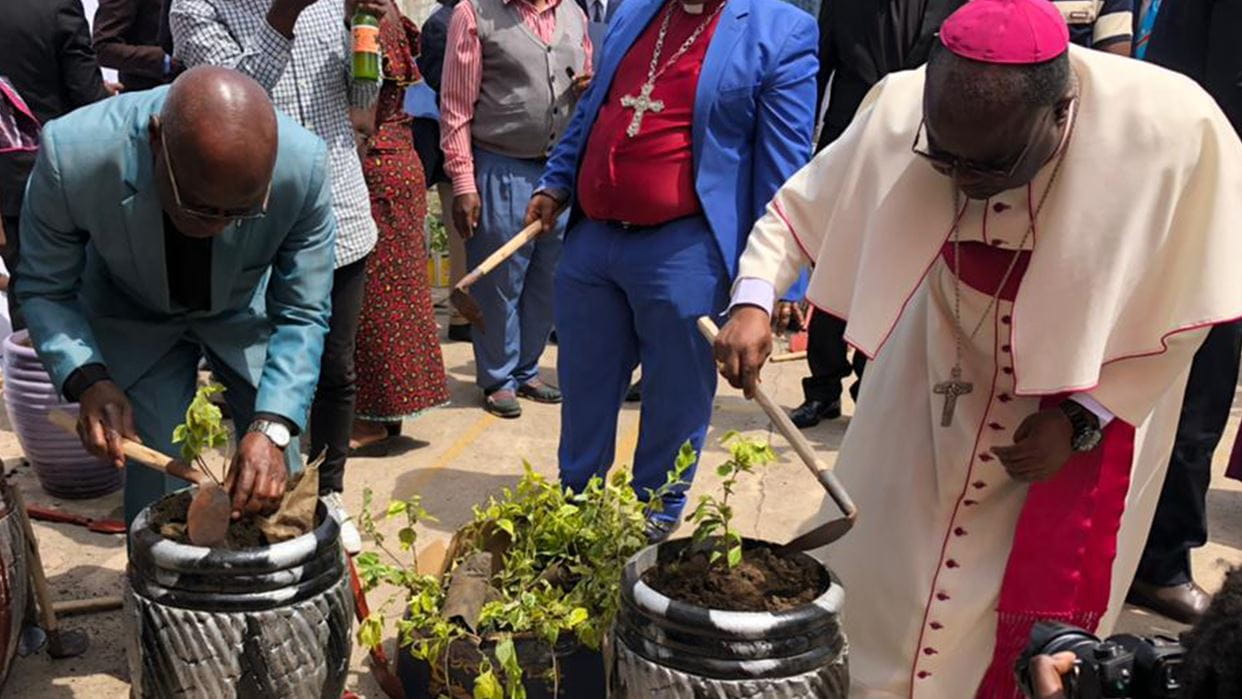
The Democratic Republic of Congo is one of the hardest places to live on Earth. Decades of war and violence have cost hundreds of thousands of lives and forced millions of people from their homes. Tens of thousands of children have been recruited by armed gangs to fight.
The Christian development agency Tearfund has a partner organisation that seeks to take positive steps to work for peace and save these children from the physical and emotional harm of war. Last year, more than 3,300 children were rescued from armed groups.
As part of this project, the guns that came with them have been melted down and turned into gardening tools, to put Isaiah’s vision into practice. The outcome is a community that is less in fear of war, and that can better feed themselves. What can we learn from their example?
First of all, it was an ecumenical project. Not one, but many churches of different traditions got involved. Practical forms of mission like this bring Christians together on common ground to work for the good of the community.
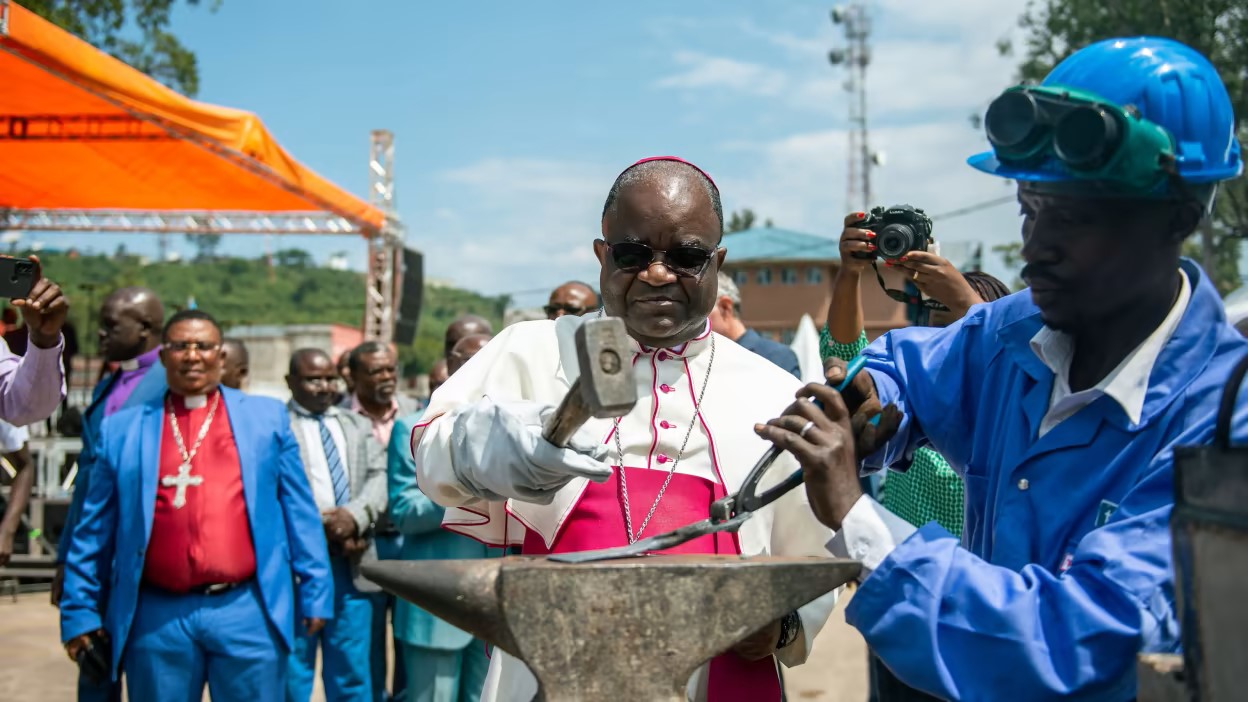
But it was hard work. Rescuing children from armed gangs is highly risky. Melting down steel is very hot work; beating it into shape on an anvil as this pastor is doing is hard physical work. Using the tools, whether to dig an allotment or plough with oxen, is equally hard. When we work with God to bring a vision of hope into reality, it will mean hard work in one form or another.
What made it worth the hard work? It was the vision of peace and hope, the vision found throughout the Bible that God wants to redeem people from war, poverty and slavery and give them a hope that will last. it was an idea rooted in the love of Jesus and the hope that he brings. In the words of a Tearfund spokesperson:
“We cannot do what we do without the hope of Jesus.
We cannot do what we do without the power of Jesus.
We cannot do what we do without the love of Jesus.”
Those Congolese Christians realised that the vision of hope couldn’t wait for the fighting to end. They had to act even as war raged around them. As in Isaiah’s day, they heard the call to strive for justice and peace even in the face of the troubles around them.
It’s good to see what’s happening around the world. But Isaiah’s prophecy, although part of God’s plan for the world, was also for the people of his own city, Jerusalem. What might it mean for us, here and now, in Leeds?
Today’s reading also speaks of the ‘mountain of the Lord’s house’. Isaiah’s vision includes many people saying ‘come, let us go up to the mountain of the Lord, to the house of the God of Jacob’. This is a theme that appears throughout Isaiah and represents Jerusalem, a symbol of the whole Jewish people, but also the coming Kingdom of God. The people who worshipped God in the Temple had a calling to reach out to the surrounding nations and participate in bringing God’s peace and justice to those around them.
A few years ago I spoke in a sermon about the problem of loneliness in our society, which is one of the particular concerns of our own MP, Rachel Reeves. I quoted from another part of Isaiah’s vision, which also draws on that symbolism of the mountain of God. In chapter 25 it says “On this mountain, the Lord of Hosts will make for all peoples a feast of rich food, a feast of well-aged wines”. That prophecy may point to the sacrifice of Christ on the Cross, and the communion service in which we remember that. The broken bread is the life of Christ, broken in order to be shared with everyone who needs it.
Just like turning arms into tools, the sharing of bread as a symbol of the sharing of the life of Christ, and the vision of a feast of rich food in God’s holy place, is one that can be acted out in the reality of people’s daily lives.
Along with other churches and charities in Bramley, we aim to bring some hope this Christmas to families who are struggling to afford food, by giving them a full Christmas dinner. In line with Isaiah’s vision of God’s feast – one of rich food and well-aged wine – we offer not just meat and veg, but all the trimmings, the crackers and the sweets to make the day enjoyable.
In sharing with our neighbours in this way, we want not only to feed them, but also bring the hope that comes from feeling part of a wider community and of participating in the joy of Christmas. If this is what hope looks like for the people of Bramley this Christmas time, hope cannot wait.
Amen.
